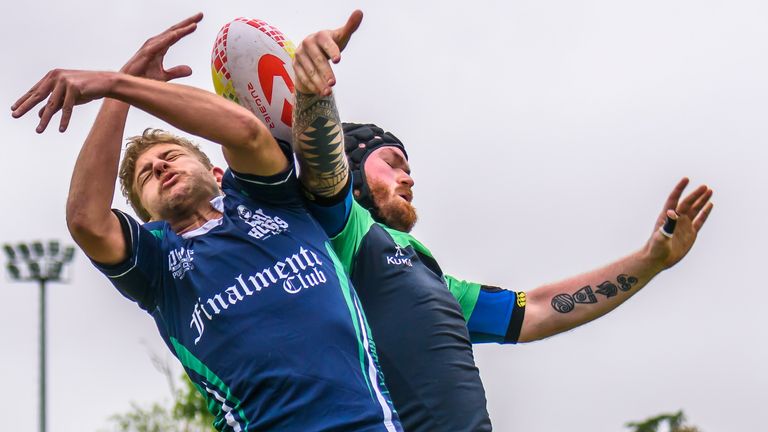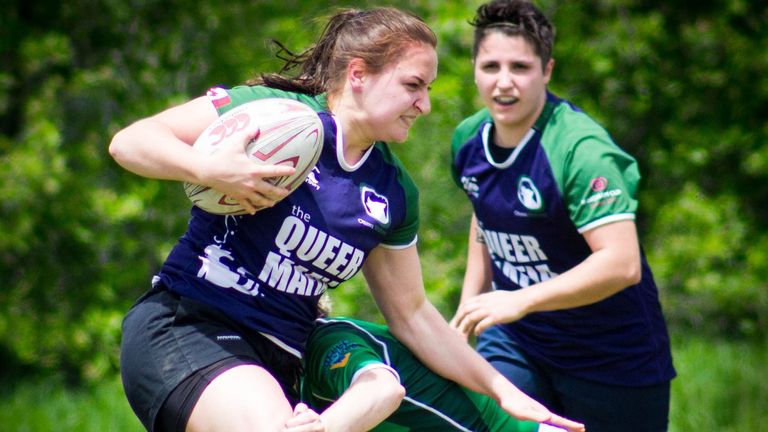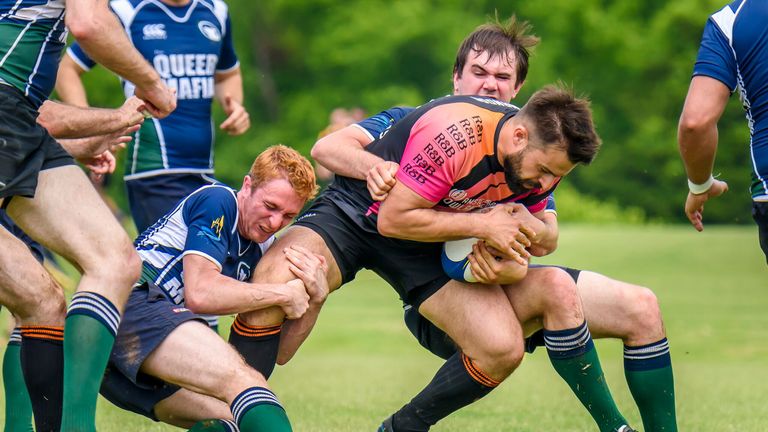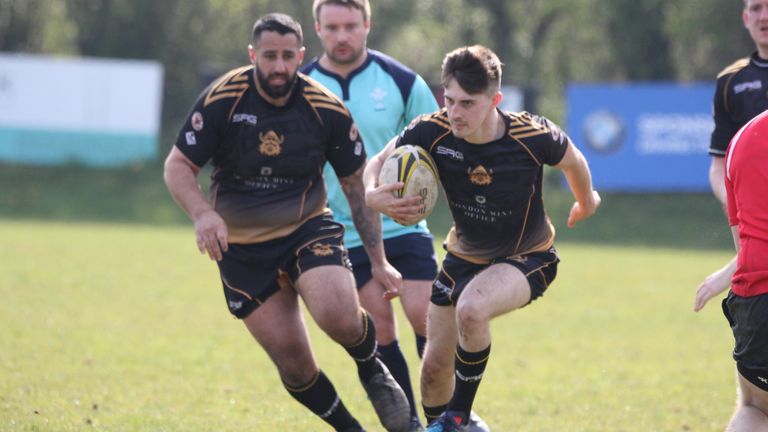What makes gay rugby's Bingham Cup tournament so special?
Event organiser Marc-Paul Stufkens expecting 1700 players in Amsterdam this weekend; excitement building for Swansea Vikings' Sam Meredith; Kings Cross Steelers' Robbie Brennan shares remarkable story of recovery
Wednesday 6 June 2018 21:09, UK
"Until you're part of the Bingham Cup, you don't realise how big it is," says Marc-Paul Stufkens, one of the organisers of the 'World Cup' of gay rugby that will welcome over 2000 players, coaches, officials and supporters to Amsterdam this weekend.
"There are all these teams, training somewhere in little spots of cities around the world. Then all of a sudden, every two years, you see they're each part of this worldwide gay rugby community. You never really think about it in that way - but then you see it. And it's wonderful."
Stufkens, speaking to Sky Sports from the Dutch capital where he plays for the Lowlanders, recalls his first trip to play at Bingham, in the fourth edition of the tournament held in Dublin 10 years ago. "The first one you go to is always the best," he says. "In Ireland, there was this big, warm community feeling that I've never felt before. You may have been playing for a while and then you go and see so many others and you just think 'bloody hell!' Rugby is an amazing sport, first of all, and playing in any tournament is great fun. But to do it with people who have the same background as you, and maybe a shared story of struggle..." There's a slight choke in his voice, and he apologises for getting emotional - "it's my allergies," he laughs, "and I'm not sleeping that well! I just hope that we can do the same for a lot of other people. It's so big now. We have to focus on keeping it at a human level."
Stufkens had to take a sabbatical from his day job in banking to oversee Bingham Cup planning. "It's tough. We're amateurs!" Gay rugby clubs from all over the world are about to descend on Amstelveense, a suburb in the south of the city. The first tournament, in San Francisco in 2002, featured only eight sides; this year, the final tally will be approaching 80. Around 1700 players will take to the field, with another 600 people registering as coaches, physios, officials and supporters. 500 organisers and volunteers will attempt to keep everything running smoothly. The Bingham Cup just keeps on growing; appropriately, its tagline for 2018 is 'Prepare for Impact'.
"Our club is one of the largest for rugby in the Netherlands - we have around 600 members," explains Stufkens. The complex of nine pitches is used to hosting events, but this one - despite being 'only' LGBT-focused - will test its logistical capabilities to the limit.
"It's a 15s tournament, and we have full squads," says Stufkens. "Most of them will have 25 players. Also, the bigger clubs enter more than one team - and they're all going to be playing five or six matches in a three-day tournament. The Netherlands is a small country, and rugby is a small sport here. So this is going to be intense."
The Lowlanders' Amsterdam bid won out over Edinburgh, London and Toronto for the right to host this year. It's also the first time that the Bingham Cup will take place on continental Europe. The tournament itself is the flagship event of International Gay Rugby and takes its name from Mark Bingham, who played for the San Francisco Fog - a founding member of IGR - and later established the Gotham Knights club in New York City. Bingham died in the September 11th terror attacks; a passenger on the United Airlines Flight 93 from Newark to San Francisco that fateful morning in 2001, he is widely accepted to have been part of the group who attempted to regain control of the plane from the hijackers, resulting in its crash in a Pennsylvania field.
"The original idea was to honour Mark, so there's a very special reason as to why it started," says Stufkens. "It's also special, of course, because the vast majority of its participants are from the LGBT community.
"There are a number of gay sports events - the Gay Games, for example - but this is the only one that focuses on rugby union.
"It's a platform to help make gay people from all across the world visible. Rugby is not necessarily immediately connected to LGBT causes, but we want to show we're here and playing rugby just like any other person. For anyone who might be interested in participating in sport and never dared to do it, or feared they wouldn't be good enough, or just thought that rugby wouldn't be for them... the Bingham Cup is really a role model, in that respect."
For gay rugby clubs, the competition, community and celebration that the biennial Cup embodies serves as a beacon, wherever they might be in the world. The USA and Canada will supply teams from 27 clubs to Amsterdam, complete with strong-sounding nicknames like Portland Lumberjacks, Madison Minotaurs and Nashville Grizzlies. There's a bit of tongue in cheek around in the naming conventions too - the club from Baltimore, home of legendary gay movie director John Waters, are called the Flamingos. One of the three German clubs entering are the Munich Monks; from France, there's Les Coqs Festifs; and flying in all the way from Australia are the Convicts from Sydney (four-time champions) and the Hustlers from Brisbane.
This year, there will be a four-team women's tournament too; previously there hadn't really been the demand. "Team sport is different, especially for gay men," says Stufkens. "And after all, Bingham was originally set up as a men's tournament. But we have had exhibition games for women, and now we're trying to open it up further. It would be silly not to try. There's more development in the LGBT teams for women now, and it's great to be able to provide more of a platform."
Stufkens describes team sports culture for gay men as "a little more complicated" than for their straight counterparts. "There have been developments, and it becomes easier for people who are gay to start participating in team sports when they're younger, but the reality is that a lot of guys playing only come to it at a later age.
"Maybe they've been exposed to rugby in school and they come from a country where the sport is played a lot but they've never really gotten into it, and only do so in their 20s or 30s."
Sam Meredith was one such player. He's heading to his first Bingham this summer as a back for the Swansea Vikings, who launched in 2015. "I had no real rugby experience before I joined," says the 28-year-old, "and it was very daunting. I suffered big time with low confidence and anxiety. I was so shy, especially with trying to get to know people.
"But the boys were so welcoming and helpful, and I was soon able to find my bearings and just learn the game. I knew I was more of a runner than a rucker, but now I feel I can play pretty much anywhere - except the front row. I couldn't do their job!"
For Meredith and his team-mates, there'll be national honour at stake at Bingham too. "We're the only Welsh club competing as our own team, and we're undefeated against other IGR teams in the UK," he says proudly. However, he's quick to stress that it's the spirit of the tournament that matters most. "For there to be so many teams playing there, from so many different walks of life, is really exciting. I've spoken to a few people who have been before and all I get is glowing recommendations."
He also sees it as a milestone on his personal journey. "The sport has really changed me as a person." He pauses. "In all honesty, I wouldn't have been able to have this conversation now if it wasn't for the Vikings."
Wales will be one of 16 nations sending teams to Amsterdam (players from the Cardiff Lions will compete too, having linked up with the Birmingham Bulls), and there will also be Barbarians XVs to give other opportunities to individuals not playing for one of the registered clubs. Stufkens wants more continents represented in years to come. "We hope to see South Africa and Argentina entering soon - they of course also have a very strong rugby tradition.
"Where we haven't seen great progress yet is Asia, although there is some talk of a few players from Japan coming this year. Kenya might be one for the future too. But it's a bit beyond our scope at the moment. Geographically these countries are isolated. We try to support in terms of fundraising - they're just not that far ahead yet."
The message that the Bingham Cup sends out still has global power, he insists. "Here in the Netherlands, we might not need to talk about 'emancipation' for gay people anymore, but visibility - to show across the world that this is happening, that we're playing rugby just like any other person - is important." With attitudes to LGBT inclusion in the sport having come under scrutiny in recent months by way of the Israel Folau controversy (the IGR issued a statement to say it was "disheartened" by the Australia star's views), Stufkens feels more sensitivity is needed.
"I don't think it's ingrained homophobia, it's more like people don't really get it - and then when an incident comes, they're like 'oh s**t, now we understand again'.
"But I find in general that officials are quite good in addressing it. At the Dutch level, we have been talking about trans participation, and it's like 'of course they're allowed to play'. We are not big political pushers; here, at least, integration is far advanced."
Robbie Brennan, of London's Kings Cross Steelers - the world's first gay rugby club - understands rugby's family feel better than most. At Bingham 2016 in Nashville, the Irish winger helped the club's 2nd XV claim the 'King of the B Teams' title and 10th place overall. However, 12 months later he was recovering in hospital after a serious road accident, having been knocked off his bicycle in a hit-and-run. "I was riding home having finished a half day at work, came to a crossroads where I had right of way, and the car just hit me side on. I went under the front wheel. Then the driver panicked - I actually heard him scream - and he accelerated right over me."
After a long wait on hot tarmac for an ambulance, he arrived at hospital with significant internal bruising, but fortunately no broken bones. Playing with the Steelers had toughened him up, yet there was no shortage of agony to come. "I had superficial wounds that got infected twice over, and I needed crutches for my hip. It took six months to get over the pain."
Through it all, the club ensured he received vital physiotherapy treatment and looked out for his mental wellbeing too. "Being far from home, in a different country, and for a while not being able to do anything for myself, it was really hard," he says. "But the support I got, not just from my close friends but also people connected to the Steelers that I didn't know that well before, meant everything to me.
"I tried to come back to playing in January but it was too soon. There was still a bit of shock and anxiety there. I asked to be taken off after a smash. I needed to give myself more time.
"So I tried again fully in March, with the seconds, and I really felt back on top of everything then - and soon I was back with the first team."
Brennan's comeback coincided with the finale to a landmark season for the Steelers, who won their league to earn promotion to the London Essex 3 division - the eighth tier of the English rugby pyramid, and what will be the highest level at which a gay and inclusive team has ever played in the UK. First comes the challenge of Bingham, in which Australian and US teams have contested every final since the Steelers finished as runners-up a decade ago.
Yet as Stufkens says, with his memories still strong of that first trip to Dublin, it's always been about the playing, not the winning. "We're here for those who might be interested in participating in sport and never dared to do it, or feared they wouldn't be good enough, or thought that rugby wouldn't be for them," he says. It's the same ethos that inspired Meredith, who decided one day to "get stuck in" and has never looked back: "Rugby will definitely change your life for the better, for the friends you make and the family you gain."
As for Brennan, he will be one of over 150 Steelers players present, with the club providing six teams in total. "For people to keep coming together from around the world... it's so important to still have that and to keep it alive," he says. "And above all, it's a celebration of Mark Bingham's life. It's a way to honour him."
As in previous editions, it will be Bingham's mother, Alice Hoagland - always the VIP guest at the tournament - who will present the Cup that bears her son's name to the eventual winners. In an interview with ESPN Scrum in 2014, she explained how Mark, even though he was "a big guy full of confidence", faced difficulties in life for being gay. Friends and family say it was her spirit that always gave him courage. Now, years after he stood up for what he knew was right while travelling home one autumn morning, he's still inspiring thousands of others to find their own bravery and brotherhood through rugby.
The Bingham Cup 2018 tournament begins in Amsterdam on Friday and runs until Sunday.















